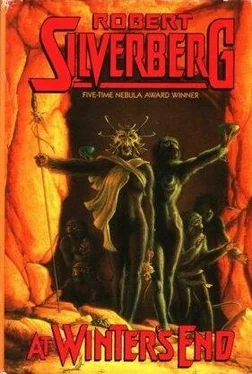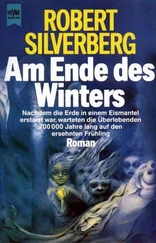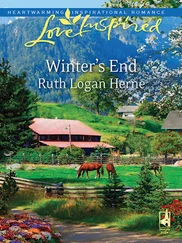For the fullness of the catastrophe was at once apparent to Thaggoran. His years of roving these dark abandoned passageways had inscribed an indelible map of their intricate patterns in lines of brilliant scarlet on his mind. The upward route of these vast indifferent monsters drilling slowly through earth and rock would in time carry them crashing through the heart of the dwelling-chamber where the People had lived so many thousands of years. There could be no doubt of that. The worms would be coming up right below the place of the altarstone. And the tribe was no more capable of halting them in their blind ascent than it would be of trapping an onrushing death-star in a net of woven grass.
Far above the cavern where Thaggoran knelt eavesdropping on the ice-eaters, Torlyri the offering-woman, who was the twining-partner of Koshmar the chieftain, was at that moment nearing the exit hatch of the cocoon. It was the moment of sunrise, when Torlyri went forth to make the daily offering to the Five Heavenly Ones.
Tall, gentle Torlyri was renowned for her great beauty and sweetness of soul. Her fur was a lustrous black, banded with two astonishing bright spirals of white that ran the whole length of her body. Powerful muscles rippled beneath her skin. Her eyes were soft and dark, her smile was warm and easy. Everyone in the tribe loved Torlyri. From childhood on she had been marked for distinction: a true leader, one to whom others might turn at any time for counsel and support. But for the mildness of her spirit, she might well have become chieftain herself, and not Koshmar; but beauty and strength alone are insufficient. A chieftain must not be mild.
So it was to Koshmar and not Torlyri that they had come, on that day, nine years earlier, when the old chieftain Thekmur had reached the limit-age. “This is my death-day,” sinewy little Thekmur had announced to Koshmar. “And so this is your crowning-day,” said Thaggoran. Thus Koshmar was made chieftain, as it had been agreed five years before that. For Torlyri a different destiny had been decreed. When, not long afterward, it was the time of Gonnari the offering-woman to pass through the hatch as Thekmur had, Thaggoran and Koshmar came to Torlyri to place the offering-bowl in her hands. Then Koshmar and Torlyri embraced, with warm tears in their eyes, and went before the tribe to accept the election; and a little later that day they celebrated their double accession more privately, with laughter and love, in one of the twining-chambers.
“Now it is our time to rule,” Koshmar told her that day. “Yes,” Torlyri said. “At last, our time is here.” But she knew the truth, which was that now it was Koshmar’s time to rule, and Torlyri’s time to serve. Yet were they not both servants of the People, chieftain as well as offering-woman?
Each morning for the past nine years Torlyri had made the same journey, when the silent signal came through the eye of the hatch to tell her that the sun had entered the sky: out of the cocoon by the sky-side, up and up through the interior of the cliff along the winding maze of steep narrow corridors that led toward the crest, and at last to the flat area at the top, the Place of Going Out, where she would perform the rite that was her most important responsibility to the People.
There, each morning, Torlyri unfastened the exit hatch and stepped across the threshold, cautiously passing a little way into the outer world. Most members of the tribe crossed that threshold only three times in their lives: on their naming-day, their twining-day, and their death-day. The chieftain saw the outer world a fourth time, on her crowning-day. But Torlyri had the privilege and the burden of entering the outer world each morning of her life. Even she was permitted to go only as far as the offering-stone of pink granite flecked with sparkling flakes of fire, six paces beyond the gate. Upon that holy stone she would place her offering-bowl, containing some little things of the inner world, a few glowberries or some yellow strands of wall-thatching or a bit of charred meat; and then she would empty yesterday’s bowl of its offerings and gather something of the outer world to take within, a handful of earth, a scattering of pebbles, half a dozen blades of redgrass. That daily interchange was essential to the well-being of the tribe. What it said to the gods each day was: We have not forgotten that we are of the world and we are in the world, even though we must live apart from it at this time. Someday we will come forth again and dwell upon the world that you have made for us, and this is the token of our pledge.
Arriving now at the Place of Going Out, Torlyri set down her offering-bowl and gripped the handwheel that opened the hatch. It was no trifling thing to turn that great shining wheel, but it moved easily under her hands. Torlyri was proud of her strength. Neither Koshmar nor any man of the tribe, not even mighty Harruel, the biggest and strongest of the warriors, could equal her at arm-standing, at kick-wrestling, at cavern-soaring.
The gate opened. Torlyri stepped through. The keen, sharp air of morning stung her nostrils.
The sun was just coming up. Its chilly red glow filled the eastern sky, and the swirling dust motes that danced on the frosty air seemed to flare and blaze with an inner flame. Beyond the ledge on which she stood, Torlyri saw the broad, swift river far below, gleaming with the same crimson stain of morning light.
Once that great river had been known as the Hallimalla by those who lived along its banks, and before that it had been called the Sipsimutta, and at an even earlier time its name was the Mississippi. Torlyri knew nothing of any of that. To her, the river was simply the river. All those other names were forgotten now, and had been for hundreds of thousands of years. There had been hard times upon the earth since the coming of the Long Winter. The Great World itself was lost; why then should its names have survived? A few had, but only a few. The river was nameless now.
The cocoon in which the sixty members of Koshmar’s tribe had spent all their lives — and where their ancestors had huddled since time out of mind, waiting out the unending darkness and chill that the falling death-stars had brought — was a snug cozy burrow hollowed out of the side of a lofty bluff rising high above that mighty river. At first, so the chronicles declared, those people who had survived the early days of black rains and frightful cold had been content to live in mere caves, eating roots and nuts and catching such meat-creatures as they could. Then the winter had deepened and the plants and wild animals vanished from the world. Had human ingenuity ever faced a greater challenge? But the cocoon was the answer: the self-sufficient buried enclosure, dug into hillsides and cliffs well above any likely snow line. Small groups of people, their numbers strictly controlled by breeding regulations, occupied the cocoon’s insulated chambers. Clusters of luminescent glow-berries afforded light; intricate ventilation shafts provided fresh air; water was pumped up from underground streams. Crops and livestock, having been elegantly adapted to life under artificial illumination by means of magical skills now forgotten, were raised in surrounding chambers. The cocoons were little island-worlds entirely complete in themselves, each as isolated as though it were bound on a solitary voyage across the deep night of space. And in them the survivors of the world’s great calamity waited out the time, by centuries and tens of centuries, until the day when the gods would grow weary of hurling death-stars from the sky.
Torlyri went to the offering-stone, set down her bowl, looked in each of the Five Sacred Directions, spoke in turn the Five Names.
“Yissou,” she said. “Protector.
“Emakkis. Provider.
Читать дальше












